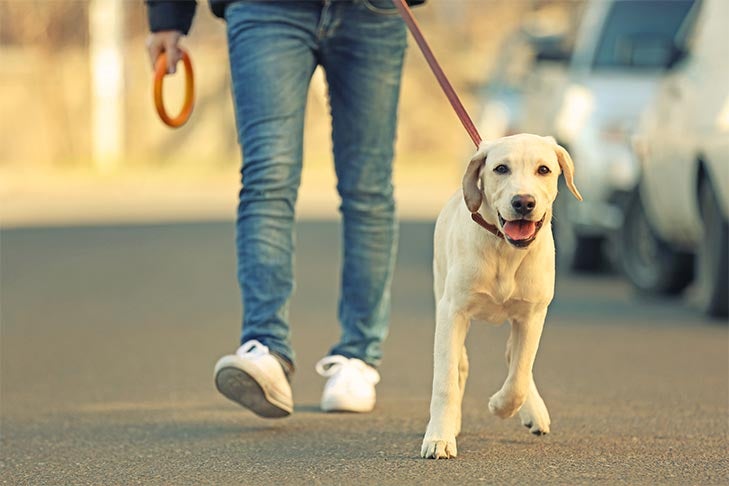
Dog owners reap many benefits from their canine companions – love and affection, nonjudgmental friendship, social connections, exercise incentives, stress relievers, guardians – and the list goes on.
But, dog ownership also comes with significant financial costs. When buying a house, car, or living room furniture, most people carefully consider and plan for the costs. When it comes to acquiring a dog, it’s also important to save and be prepared for the initial one-time costs, the annual costs, and the unexpected costs of dog ownership.
Purchase Price Is Just the First Step
Your friend’s mother’s dog is having puppies, and they’ve offered you one free of charge. Even though your income and savings are limited right now, a free puppy is a good deal – right? Wrong.
Whether your new dog comes free, is rescued for a couple of hundred dollars, or purchased from a breeder for up to a few thousand dollars, the lifetime expenses of keeping a dog healthy and happy turn out to be similar. Over the course of their lives, dogs need quality food, regular grooming, routine veterinary care, training, flea, tick, and heartworm preventatives, and much more. Being financially prepared for a puppy is a big part of responsible dog ownership.
In addition to the purchase price, there are a number of variables that can affect the cost of keeping a dog. The size of your dog can cause expenses to vary. Larger dogs eat more food, cost more to board, and are more expensive to groom.
A 2017 Money Magazine article estimated the lifetime costs of a small dog with an average life expectancy of 15 years at $15, 051. A medium dog with 13-year life expectancy was estimated at $15,782, and a large dog with a 10-year life expectancy at $14,480. In general, small dogs live longer than big dogs, although that can differ by breed.
Coat type can impact grooming costs. You may spend $25 on a brush and another $25 for shampoo and be all set to keep your Beagle clean and spiffy. Or you may spend $80 every eight weeks to take your Standard Poodle to a professional groomer.
The geographic area you live in will also impact your financial burden. Veterinarians, boarding kennels, and groomers in high-rent areas such as New York or San Francisco may need to charge higher prices. The quality and experience of service providers will also influence the price you pay.

Being Financially Prepared for Dog Upkeep
The American Pet Products Association said U.S. spending on pet products and services soared above the $100 billion mark in 2020 for the first time in history. Thirty percent of pet owners spent more on their pets in 2019-20 than they had before.
Research has shown that the majority of pet owners in the U.S. underestimate the first-year costs of pet ownership, as well as the lifetime costs. The following range of estimates can help you decide whether you can afford to get a dog – and how much you may need to save to be a responsible pet owner.
One-Time Costs
- $500 – $5,000 – Purchase price of a purebred puppy
- $50 – $300 – Adoption fee from a shelter
- $50 – $300 – Spay or neuter procedure
- $60 – $250 – Crate
- $150 – $350 – Supplies (leash, collar, ID tags, food bowls, brush, dog toothpaste, shampoo, bed)
- $65 – $70- New puppy exam
- $75 – $100 – Puppy core vaccines
- $25 – $50 – Microchip
- $150-$250 – Puppy kindergarten
Annual Costs
- $275 – $800 – Food
- $50 – $500 – Grooming
- $150 – $400 – Veterinary fees (wellness checkups, vaccines)
- $120 – $480 – Treats and toys
- $5 – $20 – Licensing
- $150 – $310 – Flea and tick prevention
- $130 – $180 – Heartworm prevention and annual test
- $25 – $75 – Boarding per day
- $45 – $75 – Pet sitters per night
- $12 – $40 – Daily dog walkers or daycare
- $150 – $250 – Training (group lessons, 6-8 sessions)
- $100 – $130 – Training (private lessons, per hour)
- $900 – $1,400 – Board and train, per week
Medical and Emergency Costs
- $500 – $1,000 – Teeth cleaning
- $14 – $55 – Deworming (not including $25- $45 fecal test)
- $65 – $150 – Ear infection
- $3,500 to $5,00 – Surgery for torn ACL
- $200 – $1,000 – Broken bones
- $150 – $250 – X-rays
- $800 – $1,500 – Emergency vet visits
- $300 – $1,000- Arthritis medication per year
- $300 – $6,000 – Cancer treatment
- $200 – $300 – End-of-life costs
Optional Costs
- $200 – $600 – Pet insurance, annually
- $1,500 – $3,000 – Fencing for average yard
- $25 – $35 – Competition entry fees per event
- $50 – $100 – Housing rental pet fees, per month
- $125 – $300 – Domestic flights, each way
- $10,000 – $25,000 – Care planning (for the care of your pet if you die)
What’s the Value of a Dog?
After looking at all of these numbers, you might be apt to ask, what is the value of a dog? Can you apply a dollar sign to your best friend? True dog lovers agree that the joys and benefits a dog provides make the dog priceless.
However, everything comes with a price, and that includes your dog. Is it worth it? Most owners would answer with an unequivocal “yes!” but it should not be an impulse decision. Take the time to get ready and save ahead with some sound financial planning. It’s best to make sure you’re fully financially prepared for the ongoing, long-term costs required to keep your new family member healthy and happy.
Disclaimer: All of the costs provided in this article are estimated averages based on information collected from veterinary clinics, shelters, training facilities, and other dog professionals. They may vary widely based on geographic area, age and breed of the dog, and supplier.
Financial preparedness is a part of responsible dog ownership, and the right banking products can make a big difference. Savings Connect from CIT Bank helps you boost savings and earn more when you bundle with a linked eChecking account. With a Savings Connect account, you can access your accounts 24/7 online, through the CIT Bank mobile app, or through any U.S. ATM with your eChecking debit card. CIT doesn’t charge ATM fees and reimburses up to $30 in other U.S bank’s ATM fees on your eChecking account. With Savings Connect, owners can focus less on finances and more on spending quality time with their dogs. CIT Bank, N.A. is a member of the FDIC.

